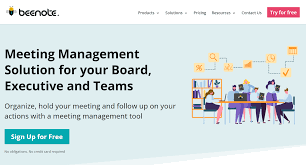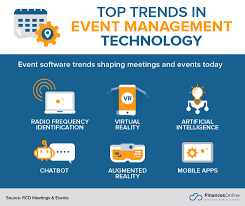Meeting Management Software: A Guide to Free Solutions
Meetings are essential for collaboration and communication in any organization. To ensure that meetings run smoothly and efficiently, many businesses turn to meeting management software. While there are paid options available, there are also free solutions that can help you streamline your meeting processes without breaking the bank.
Benefits of Free Meeting Management Software:
- Cost-Effective: Free meeting management software allows you to improve your meeting efficiency without incurring additional costs.
- Easy Access: Most free solutions are cloud-based, making it easy for team members to access meeting information from anywhere.
- Basic Features: While free software may not have all the bells and whistles of paid versions, they often provide essential features like agenda creation, attendee management, and meeting minutes recording.
Popular Free Meeting Management Software Options:
- Doodle: Doodle offers a free version that allows you to schedule meetings, create polls for availability, and send out invitations.
- Meetingbird: Meetingbird’s free version includes features such as calendar integration, meeting scheduling, and automated reminders.
- Calendly: Calendly’s basic version is free and provides tools for scheduling meetings with external participants easily.
While these free options can help you get started with meeting management software, keep in mind that they may have limitations compared to paid versions. Consider your organization’s specific needs and requirements before choosing a solution. With the right tools in place, you can make your meetings more productive and efficient.
9 Essential Tips for Choosing the Best Free Meeting Management Software
- Look for software that offers basic meeting management features for free.
- Ensure the software is user-friendly and easy to navigate for all team members.
- Check if the free version includes features like agenda creation, attendee management, and action item tracking.
- Verify if the software allows integration with calendar applications for seamless scheduling.
- Consider software that offers collaboration tools such as file sharing and real-time editing during meetings.
- Look for options with notification capabilities to remind attendees of upcoming meetings or pending actions.
- Choose a platform that provides analytics or reporting features to track meeting productivity and outcomes over time.
- Ensure the software has reliable customer support in case you encounter any issues while using it.
- Read user reviews and ratings to get insights into the pros and cons of different meeting management software available for free.
Look for software that offers basic meeting management features for free.
When exploring free meeting management software options, it is beneficial to prioritize solutions that provide essential meeting management features at no cost. Look for software that offers functionalities such as agenda creation, attendee management, and meeting minutes recording without requiring a paid subscription. By choosing a tool that includes these basic features for free, you can effectively streamline your meeting processes and enhance collaboration within your organization without incurring additional expenses.
Ensure the software is user-friendly and easy to navigate for all team members.
When selecting free meeting management software, it is crucial to prioritize user-friendliness and ease of navigation to ensure seamless adoption by all team members. A user-friendly interface and intuitive navigation can help streamline the meeting process, increase productivity, and encourage active participation from all stakeholders. By choosing software that is easy to use for everyone on your team, you can enhance collaboration and communication during meetings, ultimately leading to more successful outcomes.
Check if the free version includes features like agenda creation, attendee management, and action item tracking.
When exploring free meeting management software options, it is essential to check if the available features meet your requirements. Ensure that the free version includes crucial functionalities such as agenda creation, attendee management, and action item tracking. These features are fundamental for organizing and conducting effective meetings, enabling you to streamline communication, assign tasks, and track progress efficiently. By verifying that the software offers these key capabilities, you can maximize the benefits of using free meeting management tools for your organization.
Verify if the software allows integration with calendar applications for seamless scheduling.
When considering free meeting management software options, it is important to verify if the software allows integration with calendar applications for seamless scheduling. Calendar integration can streamline the process of scheduling meetings by syncing important dates and times across platforms. This feature ensures that all team members are on the same page regarding meeting schedules, reducing conflicts and improving overall efficiency in managing meetings.
Consider software that offers collaboration tools such as file sharing and real-time editing during meetings.
When exploring free meeting management software options, it is beneficial to consider platforms that provide collaboration tools like file sharing and real-time editing capabilities. These features can enhance team collaboration and productivity during meetings by allowing participants to share documents, make edits together in real-time, and ensure everyone is on the same page. By incorporating such tools into your meeting management software, you can facilitate seamless communication and efficient decision-making processes within your organization.
Look for options with notification capabilities to remind attendees of upcoming meetings or pending actions.
When exploring free meeting management software options, it is beneficial to prioritize solutions that offer notification capabilities. These features can help ensure that attendees are reminded of upcoming meetings and any pending actions they need to take. By leveraging notification capabilities, teams can enhance communication, improve attendance rates, and keep everyone on track with their responsibilities.
Choose a platform that provides analytics or reporting features to track meeting productivity and outcomes over time.
When selecting a free meeting management software platform, prioritize options that offer analytics or reporting features to monitor meeting productivity and outcomes over time. By leveraging these tools, you can gain valuable insights into the effectiveness of your meetings, identify areas for improvement, and track progress towards your goals. Having access to data-driven analytics can help you make informed decisions to enhance meeting efficiency and drive better outcomes for your team and organization.
Ensure the software has reliable customer support in case you encounter any issues while using it.
When choosing free meeting management software, it is crucial to ensure that the platform offers reliable customer support. In the event that you encounter any issues or have questions while using the software, having access to responsive and helpful customer support can make a significant difference in resolving issues quickly and efficiently. Prioritizing software with reliable customer support can help you maximize the benefits of the tool and ensure smooth meeting management processes.
Read user reviews and ratings to get insights into the pros and cons of different meeting management software available for free.
To make an informed decision on the best free meeting management software for your needs, it’s crucial to read user reviews and ratings. By exploring feedback from actual users, you can gain valuable insights into the strengths and weaknesses of various software options. Understanding the pros and cons highlighted by users can help you assess which features align with your requirements and which limitations you are willing to work around. User reviews offer practical perspectives that can guide you in selecting the most suitable meeting management software for your organization.



